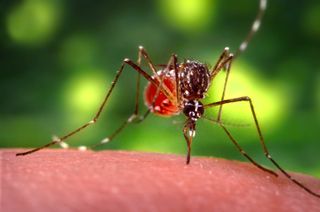Zika Warning: Pregnant Women Urged to Avoid Section of Miami

Pregnant women should avoid travel to a small part of Miami-Dade County in Florida where Zika appears to be spreading by mosquitoes, officials said today.
The announcement comes after officials in Florida said that 10 more people in the area appear to have contracted the virus from local mosquitoes, bringing the total number of local infections to 14.
What's more, tests show that efforts to control mosquitoes in the area aren't working as well as officials had hoped, said Dr. Tom Frieden, director of the Centers for Disease Control and Prevention. "This suggests there's a risk of continued active transmission" of Zika, Frieden said today (Aug. 1) in a news conference. [Zika Virus News: Complete Coverage of the 2016 Outbreak]
Because Zika infection during pregnancy can cause a serious birth defect called microcephaly, in which the child has an abnormally small head and brain, officials are recommending that pregnant women not travel to the area, which is about 1 square mile and is just north of downtown Miami.
The travel advisory appears to be the first time that officials have recommended that a certain group of people not travel to an area within the continental United States, according to Frieden.
The CDC also recommends:
- Pregnant women who live in the area, and their partners, should make every effort to avoid mosquito bites.
- Pregnant women who traveled to this area on or after June 15 (when officials suspect is the earliest date a person could have become infected) should speak with their health care providers about being tested for Zika.
- Pregnant women who live in this area or travel there frequently should be tested for Zika virus in the first and second trimesters of pregnancy.
- Women who want to become pregnant should wait at least eight weeks after returning from this area before trying to conceive. Men who have symptoms of Zika should wait at least six months before trying for pregnancy with their partner.
- Pregnant women whose sex partners live in or travel to this area should use condoms or abstain from sex for the duration of pregnancy.
- Pregnant women who live in parts of the United States where the Aedes mosquitoes (the type of mosquito that carries Zika) are present should take steps to avoid mosquito bites.
All pregnant women in the United States should be assessed for possible exposure to Zika.
Sign up for the Live Science daily newsletter now
Get the world’s most fascinating discoveries delivered straight to your inbox.
News of the first local cases of Zika in Florida came on Friday (July 29), when three men and one woman in the Miami-Dade area were found to be infected with the virus.
Although officials have already taken steps to reduce the population of mosquitoes in the area, surveys of mosquito counts are still showing moderately high levels of the insects, Frieden said. This could be because the mosquitoes are resistant to the type of insecticide that is being used, although more tests are needed to confirm this. In addition, it's possible that there are still small areas of standing water where mosquitoes can continue to lay eggs, Frieden said.
Of the 10 new Zika cases, six people did not have symptoms, but were identified after officials went door-to-door to collect and test urine samples from residents in the area.
Original article on Live Science.

Rachael is a Live Science contributor, and was a former channel editor and senior writer for Live Science between 2010 and 2022. She has a master's degree in journalism from New York University's Science, Health and Environmental Reporting Program. She also holds a B.S. in molecular biology and an M.S. in biology from the University of California, San Diego. Her work has appeared in Scienceline, The Washington Post and Scientific American.
Most Popular

